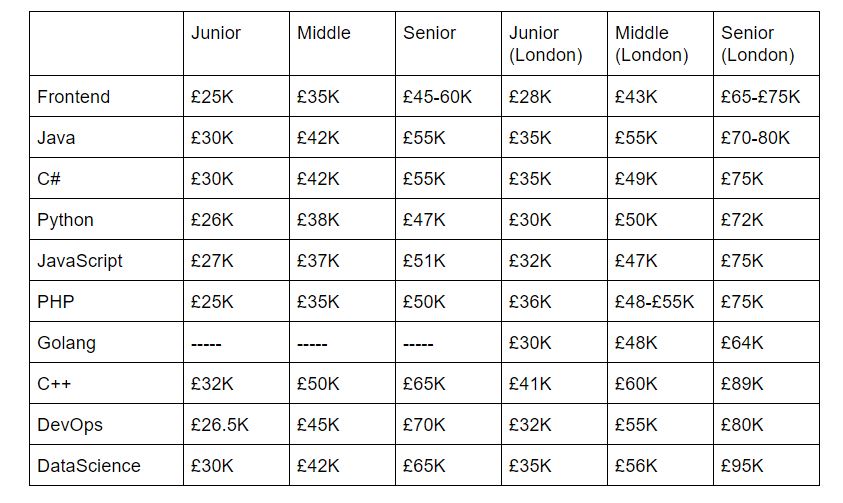
Ave, Coder!
Not so long ago, we had a video on our channel (https://youtu.be/OC4nDT7J31Q), where I analyzed the average annual salaries of programmers in the UK, as well as some basic expenses, comparing London and (the relative hinterland) Nottingham.
I think many Habr readers will find this information useful, at least, just for acquaintance and broadening their horizons.
So, a small table by programming languages, where I conditionally divided the skill level into Junior, Middle and Senior. Of course, employers are looking for you to know and related technologies. Knowledge of Git, Linux, frameworks and others like it is also included in the list of requirements, although the main search query may be one programming language, but it is used, rather, as a checkbox for searching for vacancies.
Of course, with only knowledge of Core Java, you are unlikely to be taken even as a junior, so for the legend, all the figures given imply additional knowledge, and if this topic is interesting, write in the comments, I will be happy to prepare material on the requirements for applicants - starting from technologies and experience and ending with English and soft skills.
And there is no need to write: “I have a friend in London, he earns more / less”, the figures below are the average temperature in the hospital, based on static data at the time of the review.

You can take a look here and here .
What happens to the salary afterwards? And then taxes begin.
In the UK, the PAYE (Pay As You Earn) system operates, that is, "pay in proportion to your earnings." By design, it should adjust the percentage of tax charged depending on the amount earned by the individual.
By the way, since the level of income can conditionally "jump" due to bonuses, increases, dismissals and other volatility, once a year you can receive a letter from HMRC - Her Majesty's financial inspection that you either overpaid, and they give you something there must, or underpaid, then, be kind - bring in. Exactly how much you will unfasten to the state is reflected in your tax code, that is, the tax code, which is revised once a financial year.
So, the percentage of taxation works at the following levels:
Up to £ 12,500 per year - 0%. This is the so-called "non-taxable minimum".
£ 12.501 - £ 50K - 20% Base Rate. Base rate. Typically, junior developer salary tax falls into this space. The average police salary is £ 26K per year.
£ 50K - £ 150K - 40% Higher Rate. Increased rate.
£ 150K + - 45% Additional Rate. Additional rate for everything above 150 thousand per year.
That is, if you receive, for example, £ 90K per year, then the first £ 12,500 will not be taxed, then you will pay 20% on a part of the salary in the range of £ 12.501 - £ 50K, 40% in the range of £ 50K - £ 150K, and 45% on everything else. Therefore, for many very well-earning developers, other financial incentives are provided that are taxed much less, for example, dividends.
The exception is when you earn over £ 100K per year, you lose a pound from the non-taxable minimum for every 2 you earn over £ 100K.
You can take a look here
But that's not all. The country has a National Insurance system and every Briton who has reached the age of 16 or who arrives at the first time of employment is issued a so-called National Insurance Number (NIN).
National Insurance is categorized into classes, but on average, a self-employed developer will pay 12% to this cashier.
You can take a look here .
Now we will consider other expenses that everyone will surely face. Again, these are figures that are hard to guess, provided for an overall impression. Below, I will leave a link to a site where you can see how much of what is worth by city and even compare it with the prices of your hometown.
The UK, like many other countries, is ranked by spending levels from north to south. Life in the northern counties, Scotland and Wales is much cheaper than in the same London or even on the south coast.
For example, I will be comparing the cities of London where you can buy a parking space in the area for £ 350 pieces (https://www.independent.co.uk/news/uk/home-news/uk-s-most-expensive-car -parking-space-market-ps350-000-a6939011.html) and Nottingham, located in the East Midlands, the heart of England, with the moderate prices of an average major city in the English north.
Housing rental. One bedroom flat - One bedroom flat, but in fact: living room + bedroom + kitchen + bathroom and sometimes even a corridor, in London, depending on the distance from the center and the pretentiousness of the area, it will cost an average of £ 1250 to £ 2500 per month. A similar property in Nottingham will be £ 560- £ 800 per month.
Note / observation from life. In 2008, I rented a 3 bedroom house with parking in the Nottingham suburb for £ 450 a month. Then came the credit crunch. To save the economy, the Bank of England began feverishly printing bills and bailing out banks that were playing with subprime loans. As a result, the money supply in the country has increased and you will not find prices like in 2008.
The dynamics of growth in the value of real estate in the United Kingdom can be viewed here .
Directly to the rent, you need to add a communal apartment with the so-called "council tax" - a municipal tax, which includes: the work of the police, firefighters, garbage collection and other needs of the city.
So, for council tax + water + electricity / gas + internet, you can pay off somewhere else between £ 200- £ 300 a month. Again, the amount is so approximate that I am already not on my own. Naturally, energy consumption will depend on the time of year and lifestyle, as well as the municipal tax - from the municipality, but you have to make a start from something.
By the way, for the wrong parking, you can easily unfasten from £ 20 to £ 100, depending on the city.
If you still smoke, it is better to tie it up with this before moving, since a pack of Marlboros costs £ 12 here, and the fine for a bull thrown in the wrong place at the wrong time is £ 50.
Petrol costs £ 1.24 at the time of writing and diesel £ 1.30. By the way, the price jumps every day, in addition, the European Union from which the British safely sailed away, lobbied for a law banning diesel engines. Electric refueling stations, by the way, are not uncommon here and are often installed right at street parking places, near supermarkets and even in the courtyards of residential buildings, since the government encouraged the purchase of electric cars with money and discounts.
If there is no personal vehicle, then the easiest way to get around London is by metro: from £ 130- £ 210 per month (Oyster card for help). But the travel card in Nottingham, which includes a city bus and tram, will cost £ 70 a month.
If you have a preschool child or you decided to put down roots here, or just "it happened", then I advise you to stock up on cabbage in advance, because the kindergarten will cost, on average, £ 50 PER DAY!
On the positive side, I would like to note that clothing (branded and luxury) is quite affordable relative to salaries. Food, moreover organic, is also inexpensive, it is quite rare to come across counterfeit products with broken price tags in British stores, because fines for just mislabelling can easily reach £ 40,000 per unit.
People are quite affable, well-fed, not inclined to scandal over trifles, and respect the queue very much, but squealing, the so-called "reporting" and "whistleblowing" are quite common.
There are many museums, iconic places, cultural and uncultured events, as well as pubs, pubs, pubs that often brew local ale.
If the topic is still interesting, write in the comments what other side of the developer's life in Britain should be disclosed, or the requirements for emigration and stuff like that.
Well, of course, do not forget to go to the channel .
Here's the promised "comparator site"
And if you
're interested, here are some resources for finding jobs in the UK: www.jobsite.co.uk
www.indeed.co.uk
www.monster.co.uk
www.cwjobs.co. uk
And this was V, see you soon!